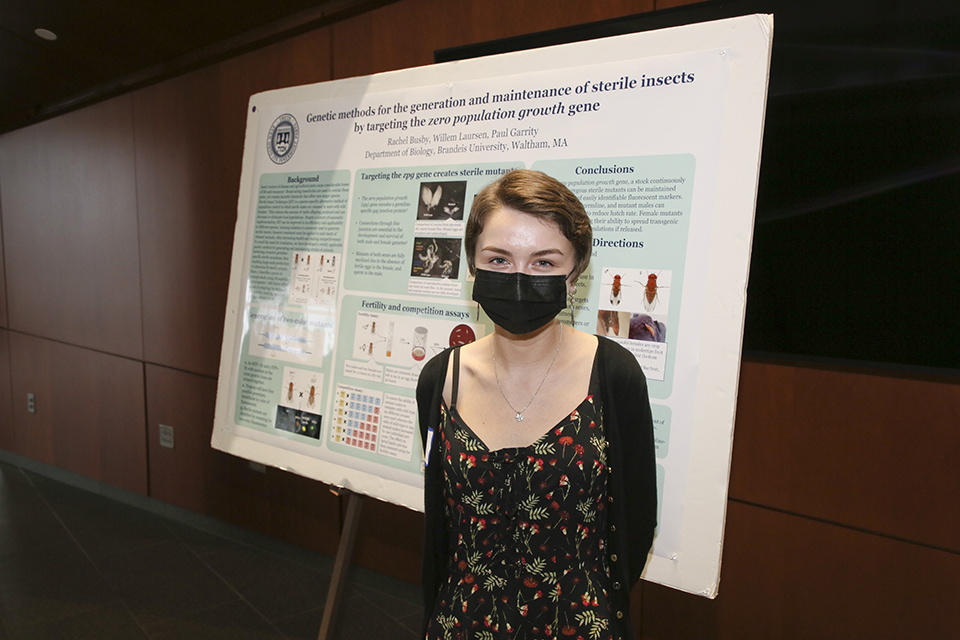Rachel Busby
M.R. Bauer Foundation Summer Science Research Fellow
Garrity Lab, Department of Biology
Brandeis University

Genetic methods for the generation and maintenance of sterile insects by targeting the zero population growth gene
Insect vectors of disease and agricultural pests cause considerable loss of life and resources. Broad-acting insecticides are used to combat these pests, yet contain harmful chemicals that cause collateral damage to non-target species. Sterile Insect Technique (SIT) is a species-specific alternative method of population control in which sterile males are released to mate with wild females. Mating induces a refractory period in females that inhibits subsequent copulation, persisting in some species for the entire lifetime of the animal, thereby reducing the number of viable offspring produced and decreasing or eliminating local populations. Despite a history of success, SIT can be improved in its efficiency and applicability to different species. Sterility is commonly induced using ionizing radiation; however, treatment must be applied to each batch of released animals, often decreasing their health and mating competitiveness. To avoid the need for irradiation, we developed a widely applicable genetic method for generating and maintaining strains of animals harboring recessive germline-specific sterile mutations, enabling large-scale production of otherwise fit sterile animals. We performed a proof-of-concept study using Drosophila melanogaster, with future efforts aimed at adapting the technique to species in which genetic tools are limited or nonexistent, such as vector mosquitoes and agricultural pests.
Personal Statement and Pandemic Reflection
Throughout my time in the Garrity Lab, I have been so grateful for the opportunity to perform research as an undergraduate. With generous support from the M.R. Bauer Foundation, I was fortunate to be able to continue my research this summer. I have had the chance to learn so much about Drosophila genetics, microinjections, and behavioral assays. Additionally, I believe this experience is helping me to become a better scientist by strengthening my critical thinking ability while I carry out my research. This summer has also reinforced that I love working in a laboratory environment, and I hope to remain in the field of biological research after graduation. The skills I have learned this summer will help me considerably in the future, not only as I begin my senior thesis in the lab this year, but also as I plan to pursue a PhD in biology.
I feel that I’ve learned so much from working in the lab, and the experience has been better than I could ask for, given the struggles from the pandemic. I am really looking forward to what my senior year in the lab will bring. It was extremely difficult to lose my ability to go into the lab during the 2020 shut-down, as my time to do undergraduate research is subsequently quite limited. However, I try not to dwell on what may have been missed, and instead I believe I am enjoying my time in the lab even more now that I know what it felt like to lose it. Attempting to perform research during a pandemic has taught me a lot about patience, as I was forced to put all of my plans on hold. This gave me a lot of time to reflect, instead of mindlessly racing to graduation and competing for the most research experience. I am grateful that the Garrity Lab was patient, too, and welcomed me back once it was safe to do so. Currently, COVID restrictions have eased somewhat, and I am trying to make the most of my remaining time in the lab. I am extremely lucky to have received this fellowship in a period where I am allowed to return to in-person research. Despite the trials COVID has presented us, I could not imagine a better group of people to go through it with than the Garrity Lab. I will forever be thankful for the support and generosity I’ve experienced from all members of the lab, and I hope to take what I have learned here to all future labs that I may work in.